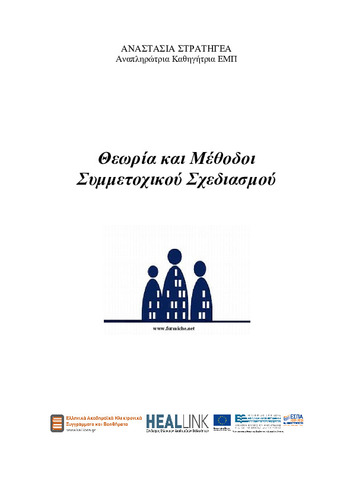| Title Details: | |
|
THEORY AND METHODS OF PARTICIPATORY PLANNING |
|
| Authors: |
Stratigea, Anastasia |
| Reviewer: |
Siolas, Angelos |
| Subject: | ENGINEERING AND TECHNOLOGY > TECHNOLOGICAL SCIENCES AND ENGINEERING > REGIONAL AND URBAN PLANNING |
| Keywords: |
Policy
Participation Local Development Participatory Planning Institutionalization Of Participation Global Initiatives Promoting Participation European Initiatives Promoting Participation Goals Of Participation Principles Of Participation Level Of Participation Types Of Participation Advantages Of Participation Participants Types Of Participants Spatial Planning Participatory Process Levels Of Participatory Planning Advantages Of Participatory Planning Difficulties Of Participatory Planning Methods Of Participatory Planning Policy Making Information And Communication Technologies (ICTs) And Participatory Planning |
| Description: | |
| Abstract: |
The increasing importance attached to the role of public participation in pursuing sustainability objectives and managing crucial environmental problems, reflects the conviction that citizens and stakeholders can, under certain conditions, constitute agents of change for coping with contemporary societal challenges. Participatory planning approaches are nowadays gaining importance in the light of the radical social, economic, cultural, environmental, technological and other developments, reflecting citizens’ and stakeholders’ request to be part of decision-making processes as to the management of resources. This request is mainly related to transparency and adoption of more democratic decision-making processes, but also to issues of legitimization and validity of decisions made.
The scope of the present book is to offer the educational material needed for teaching participatory approaches in planning in a range of scientific disciplines. The aim is to contribute, both from a theoretical and a practical point of view, to the upgrading of knowledge of young scientists on participatory planning issues, rendering them agents of change towards the wide adoption of these approaches. At the same time, its ambition is to increase their awareness and educate them in their role as active citizens, ‘cells’ of a new participatory culture in the Greek society. Finally, the book targets all those who are interested in participatory planning (policy makers, decision makers, urban and regional planners, environmentalists, local administration etc.), aiming to offer a ‘guide’ for better grasping the issues but also the value of participatory approaches, which can be implemented in a wide range of planning issues, in various scientific disciplines and at various spatial scales. |
| Table of Contents: |
1. HISTORICAL DEVELOPMENT OF THE CONCEPT OF PARTICIPATION – POLICY DIRECTIONS AT THE GLOBAL AND EUROPEAN LEVEL
2. THE CONCEPT OF PARTICIPATION 3. PARTICIPATORY PLANNING 4. CLASSIFICATION OF METHODS OF PARTICIPATION 5. METHODS FOR MAPPING DIVERSITY 6. METHODS FOR CONVERGENCE OR CONSENSUS BUILDING 7. SELECTION OF PARTICIPATION METHOD IN PLANNING 8. INFORMATION AND COMMUNICATION TEXHNOLOGIES (ICTs) AND PARTICIPATORY PLANNING |
| Linguistic Editors: |
Pantos, Panagiotis |
| Type: |
Undergraduate textbook |
| Creation Date: | 2015 |
| Item Details: | |
| ISBN |
978-960-603-241-7 |
| License: |
http://creativecommons.org/licenses/by-nc-sa/3.0/gr |
| Handle | http://hdl.handle.net/11419/5428 |
| Bibliographic Reference: | Stratigea, A. (2015). THEORY AND METHODS OF PARTICIPATORY PLANNING [Undergraduate textbook]. Kallipos, Open Academic Editions. https://hdl.handle.net/11419/5428 |
| Language: |
Greek |
| Consists of: |
1. THE CONCEPT OF PARTICIPATION 2. PARTICIPATORY PLANNING 3. CLASSIFICATION OF PARTICIPATION METHODS 4. INFORMATION AND COMMUNICATION TECHNOLOGIES (ICTs) AND PARTICIPATORY PLANNING 5. HISTORICAL DEVELOPMENT OF THE CONCEPT OF PARTICIPATION - POLICY DIRECTIONS AT THE GLOBAL AND EUROPEAN LEVEL 6. METHODS OF MAPPING DIVERSITY 7. METHODS FOR CONVERGENCE OR CONSENSUS BUILDING 8. SELECTION OF PARTICIPATION METHOD IN PLANNING |
| Number of pages |
246 |
| Version: |
1st edition |
| Publication Origin: |
Kallipos, Open Academic Editions |


